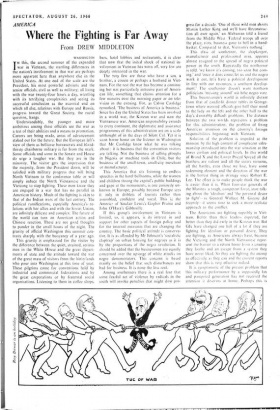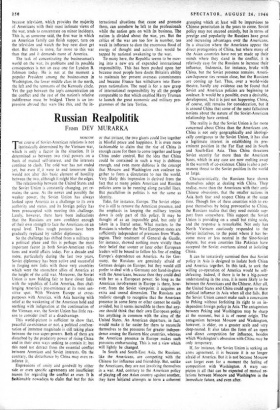Where the Fighting is Far Away
AMERICA
From DREW MIDDLETON
WASHINGTON
Understandably, the younger and more ambitious among these officials see the war as a test of their abilities and a means to promotion. Careers are being made, areas of advancement staked out for the future. But the European left's view of them as bellicose bureaucrats and blood- thirsty chairborne military is far from the mark. Some officials and some in the Senate and House do urge a tougher war. But they are in the minority. The visitor gets the impression that the majority, from the President down, will be satisfied with military progress that will bring North Vietnam to the conference table or will simply induce the North Vietnamese and the Vietcong to stop fighting. These men know they are engaged in a war that has no parallel in American history. Much of the fighting is akin to that of the Indian wars of the last century. The political ramifications, especially America's re- lations with her allies and with the Soviet Union, are infinitely delicate and complex. The future of the world can turn on American action and Chinese reaction. These are not good thoughts to ponder in the small hours of the night. The gravity of official Washington this summer con- trasts sharply with the buoyancy of a year ago.
This gravity is emphasised for the visitor by the difference between the quiet, strained, serious men in the White House and the great depart- ments of state and the attitude toward the war of the great mass of visitors from the hinterlands who pour into Washington at this time of year. These pilgrims come for conventions held by industrial and commercial federations and by the great corporations or by fraternal social organisations. Listening to them in coffee shops, bars, hotel lobbies and restaurants, it is clear that now that the initial shock of national in- volvement in Vietnam has worn off, very few are deeply interested in the war.
The 'ery few are those who have a son, a brother, a cousin or perhaps a husband in Viet- nam. For the rest the war has become a continu- ing but not particularly intrusive part of Ameri- can life, something that claims attention for a few minutes over the morning paper or on tele- vision in the evening. For, as Calvin Coolidge remarked, `The business of America is business.' Since his day the United States has been involved in a world war, the Korean war and now the Vietnamese war. American responsibility extends to every continent, the diplomatic and assistance pi'ogrammes of this administration are on a scale unthought of in the days of Silent Cal. Yet it is soon borne home on the listener in Washington that Mr. Coolidge knew what he was talking about: it is business that the convention visitors are talking. Not the business of selling ploughs in Nigeria or machine tools in Chile, but the business of the small-town, small-city merchant or manufacturer.
This America that sits listening to endless speeches in the hotel ballrooms, while the women and children throng the capital's public buildings and gape at the monuments, is one curiously un- known in Europe; possibly because Europe sees it only in driblets of tourists rather than assembled, confident and vocal. This is the Americz of Sinclair Lewis's Gopher Prairie and John O'Hara's Gibbsville.
If this group's involvement in Vietnam is limited, so, it appears, is its interest in and support for other aspects of foreign policy and for the internal measures that are changing the country. The basic political attitude is conserva- tive. It is as offended by Mr Johnson's `socialistic claptrap' on urban housing for negroes as it is by the proportions of the negro revolution. It should be added that the businessmen are equally concerned over the upsurge of white attacks on negro demonstrators. This concern is based mainly on the belief that such disturbances are bad for business. It is none the less real.
Among southerners there is a real fear that some fearful act of violence by radicals in the south will invoke penalties that might slow pro-
gress for a decade. 'One of those wild men shoots Martin Luther King and we'll have Reconstruc- tion all over again,' an Alabaman told a friend from the Middle West. `Federal troops all over the place, riots, business gone to hell in a hand- basket. Compared to that, Vietnam's nothing ' This class of southerner, the shopkeeper, manufacturer and professional man, appears almost resigned to the spread of negro political power in the south. Repeatedly the northerner is told. 'we know it's coming, too soon but coin- ing,' and 'once it does come, let us and the negro work it out, let's have a political development in line with our resources, a southern develop- ment.' The southerner doesn't want northern politicians 'messing around' wit hthe negro vote.
This businessmen's world is infinitely distant from that of candle-lit dinner tables in George- town where worried officials give half their mind to the lady on the left and the other half to the day's damnably difficult problems. The distance between the two worlds represents a problem for this administration; the problem of fixing American attention on the country's foreign responsibilities beginning with Vietnam.
Solution of the problem is impeded at the moment by the high content of complacent sales- manship introduced into the war situation at the lower civilian and political levels. In this world of Brand X and the Lower Priced Spread all the brothers are valiant and all the sisters virtuous, all the battles, even those we lose, have some redeeming element and the direction of the war is the hottest thing in strategy since Robert E. Lee. The effect is to make people think the war is easier than it is. When four-star generals of the Marines. a tough, competent force, start talk- ing about the `idealism' and 'the personal desire to fight'--as General Wallace M. Greene did recently--it seems time to seek a more realistic approach to the conflict.
The Americans are fighting superbly in Viet- nam. Better than their leaders expected, far better than they did early in the Korean war. But GIs have changed one hell of a lot if they are fighting for idealism or personal desire. They are fighting, as Americans always have, because the Vietcong and the North Vietnamese repre- sent the barrier to a return home from a. country they loathe and an escape from a system they have never liked. So they are fighting the enemy as effectively as they can and the current reports show that this is very effective indeed.
It is symptomatic of the present problem that this military performance by a supposedly lax and pampered generation has not received the attention it deserves at home. Perhaps this is because television, which proyides the majority of Americans with their most intimate views of the war, tends to concentrate on minor incidents. This is, as someone said, the first war in which an American family can finish supper, turn on the television and watch the boy next door get shot. But there is more, far more to this war than that and it demands more of America.
The task of concentrating the businessman's world on the war, its problems and its possible consequences is not an easy one for Lyndon B. Johnson today. He is not at the moment a popular President among the businessmen in Washington, the lower middle class in the north, the left and the remnants of the Kennedy circle. Yet the gap between the top's concentration on the conflict and the rest of the nation's relative indifference must be bridged. There is an im- pression abroad that wars like this, and the in- ternational situations that cause and promote them, can somehow be left to the professionals while the nation gets on with its business. The nation is divided about the war, yes. But the critics of the war are too few in number, too weak in influence to dam the enormous flood of energy of thought and action that would be tapped by national awakening to the war.
To many here, the Republic seems to be mov- ing into a new era of expanded international responsibility. This has been pushed upon her because most people here doubt Britain's ability to maintain her present overseas commitments and because France has withdrawn into Euro- pean nationalism. The need is for a new grasp of international responsibility by all the people comparable to that which enabled Harry Truman to launch the great economic and military pro- grammes of the late 'forties.































 Previous page
Previous page